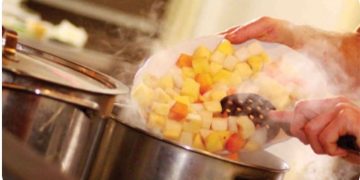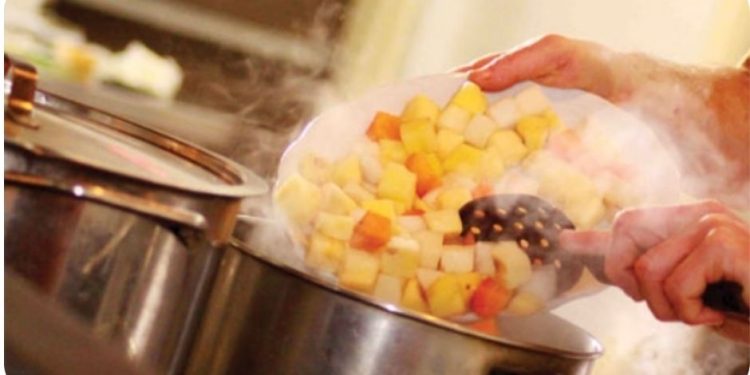When its new vegetable processing facility opens this summer, Northern Girl will be closer to achieving its goal of pursuing year-round processing of locally grown vegetables in an underserved region of northern Maine.
Northern Girl will process a million pounds of potatoes, carrots, beets, turnips, rutabaga and parsnips when its new 5,000-square-foot facility in Van Buren, Maine, is fully operational. The facility was financed, in part, by a USDA Rural Business development Enterprise Grant (RBEG).
The $650,000 building will usher in a major upgrade from the company’s current operation in an abandoned Air Force base in Limestone.
The new facility is part of a partnership with the city of Van Buren, which holds title to the property and is leasing the building to Northern Girl for 10 years. Northern Girl is supplying equipment for the operation.
The town’s leaders applied for the RBEG grant in order to develop a processing plant in the economically depressed community, and chose Northern Girl as a partner.
The municipality also received funding through the Northern Border Regional Commission (NBRC) federal grant program, which targets money for such financially challenged areas.
“It’s a good partnership, with the foundations, government and private investment coming together to try to make this happen,” said Christopher Hallweaver, Northern Girl’s general manager.
Hallweaver said the initial small commercial kitchen and processing operation allowed the company to develop and create markets for its fresh and frozen product lines.
“We are now ready for the expanded facility and are excited to move in,” Hallweaver said.
“We all share the goal of greatly increasing the amount of locally grown veggies that go into the mouths of our school and college kids, our hospitals and care centers, retirement homes and communities, workplace cafeterias and restaurants,” Hallweaver said. “We have an inexpensive land base and institutional knowledge to feed a huge part of the whole Northeast.
“We’re trying to figure out how Maine can feed Maine. We’re making great progress, but there’s only a very small, tiny amount of local food going into those institutions today,” he said. “We’ve got a big job ahead of us and we’ve identified about a dozen operations around the Northeast that share the same goal of getting more food into the local institutions and the communities. We need to get together on a smaller scale to produce economically safe food. That’s our challenge – working together to develop best practices.”
He said the evolution could lead to Northern Girl expanding its reach.
“Once we get Van Buren operating, we plan to look around for different locations,” he said. “It has to be appropriately scaled depending on the market it’s going to serve. Every region needs one or two operations like this.”
The company began in the 1990s, when Kate and Jim Cook moved to Grand Isle, Maine, and launched an organic potato farm that at one time consisted of 100,000 acres. They shipped potatoes throughout the region, including Portland, Maine and Boston, through a cooperative marketing company, Hallweaver said.
The potato operation is down to 50,000 acres these days, and value-added processing has become the focus. When Jim Cook passed away, the couple’s two daughters, Leah and Marada Cook, joined with Hallweaver to bring Northern Girl to the marketplace.
The business sells the top-notch percentage of its farm partners’ crops on the fresh market, and processes the culls and surplus to feed locavores the rest of the year.
“At Northern Girl LLC, we hope to bring opportunity to growers in Maine’s largest and most remote county,” Hallweaver said. “We hope to keep our economy thriving through building added value for the products of a multitude of small farms. We hope to bring local options to schools, restaurants and retailers across New England. We want to keep Maine in the forefront of the local foods movement by rebuilding the state’s lost food processing infrastructure.”
Currently focused on root crops, Northern Girl processes a variety of potatoes, turnips, rutabagas and carrots, among other crops.
“In the first year, we concentrated on supplying institutions such as foodservice for schools and hospitals,” Hallweaver said. “In the second year, we expanded to a retail line of products. We’re slowly but surely making use of specialty veggies. We have a fresh line, too, but frozen is what we are really concentrating on.”
He said the company will christen the new facility with a “fairly small broccoli freeze this summer as a new line. Then we’ll be ready to rock and roll with potatoes in the fall.”
Northern Girl will support 12 local farms, and the fresh produce will be washed and chopped at the facility. Eventually, the company hopes to expand to include locally grown peas and broccoli in its product line, which would allow it to process vegetables year round.
The company produces an average of 300 pounds of carrot sticks each week for students across Maine, along with other Northern Girl products. It also sells to a couple dozen schools in Maine, including the Portland public schools. Its largest customer is Maine General Hospital in Augusta.
At the end of 2012, shoppers at local markets and health food stores began to see Northern Girl’s retail products in the produce sections and freezer cases. Among the selections are Aroostook Roots Fresh Roasting Medley and salad bar beets. Also being marketed are organic russet wedges, root veggie fries, Aroostook Roots diced medley, diced Chantenay carrots, diced turnip and diced rutabaga.
“We’re going to figure out what products are popular, and when we move to Van Buren we’ll have a capacity to ramp up production.”
The company doesn’t have the capability to market to larger retailers, and that’s just fine with Hallweaver.
“We don’t pretend that we’re going to take over the world here,” he said. “We have had about five employees, seven days a week, September through April. We’re having a blast – it’s really invigorating.”
- Latest
- Trending































